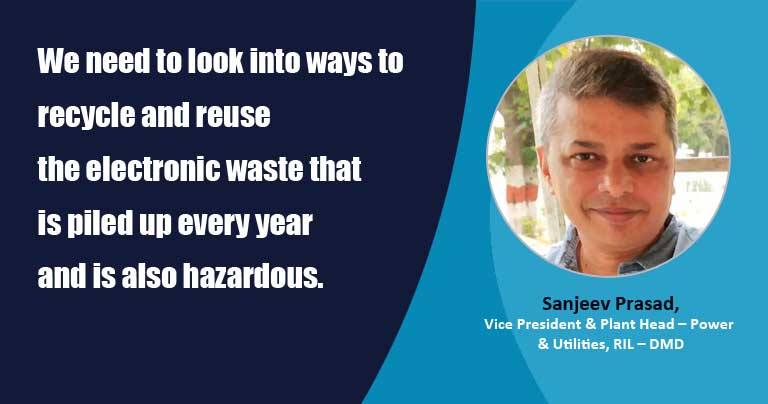We need stringent emphasis in managing and recycling electronic waste: RIL
By EPR Magazine Editorial November 15, 2021 5:53 pm IST
By EPR Magazine Editorial November 15, 2021 5:53 pm IST

In a discussion with EPR Magazine, Sanjeev Prasad, Vice President & Plant Head – Power & Utilities, RIL – DMD, explains the significance of re-examining the need to create wide access for e-waste recycling and enable a clean environment.
What’s your idea of going green?
Going green is still a distinct dream for us. Although it isn’t an impossible dream, but it has wide specifications to it. We have various means that will help us to achieve the same. Today, people are moving more towards eco-friendly substitutes, technologies, and products as a pay back to the environment and for the next generation, the way we have received from our predecessors. That is, we have to use things in an environmentally friendly and non-hazardous manner, without creating an imbalance in climate aspects.
There’s a need to include environmental lessons in education system. We need to look at three aspects, namely: improving the environment, reducing its uses, reuse, and recycling. How do you improve the environment, reduce the uses, reuse, and recycle? We are not great recyclers as our recycling capacities are not that good. But we need to look at ways to recycle and reuse the electronic waste that is being piled up every year and is retarded, which again is hazardous.
As an industrial and a domestic user, I feel that there is something called reliability that we can work on at least which prolongs the life till the time we are ready to recycle or reuse the equipment that doesn’t require high maintenance and still can be reliable in terms of functional operations.
India has very few government-approved e-waste recycling systems. What are the major challenges in increasing the infrastructure and adding more e-waste recycling centres?First is accessibility. Secondly, we are driven by laws. So, we have to comply with the given regulations, which will further drive us towards sustainability. It’s also important for the business to become profitable, otherwise nobody will come forward to invest, and we will again be dependent on the government. These are the only two ways in which a business will get recycled. The recyclers and the government need to ensure that all the relevant information is available online and on other platforms that allow us to get through those providers.
What are the strings attached to it? Is it lack of awareness, lack of willingness, or lack of consciousness to follow the regulations?
In a way, yes, we are accustomed to living in this pattern. We usually don’t follow or believe anything until we have force or pressure from the regulations. Also, consciousness is another key aspect; we usually do not accept anything that’s safe and secured for us, hence there are regulations enforced on us to ensure our own safety. We destroy or waste things we believe are useless to us, but what we fail to recognise is that electronic waste, if recycled and reused on time, is essential waste.
What is the mechanism followed for constant verification in industrial premises to find whether the regulations in place are comprehended?
If you are talking about conducting regular inspections, I think that’s difficult; particularly under present circumstances, it’s not really feasible to find out the kind of activities being carried out in large-scale industrial premises with a humungous amount of manpower to take care of. Managing e-waste and recycling should be taught as a vital part in our education so that the new generation can find ways to recycle the electronic waste being generated in the industry on a regular basis and further take care of the environmental impacts.
We use cookies to personalize your experience. By continuing to visit this website you agree to our Terms & Conditions, Privacy Policy and Cookie Policy.